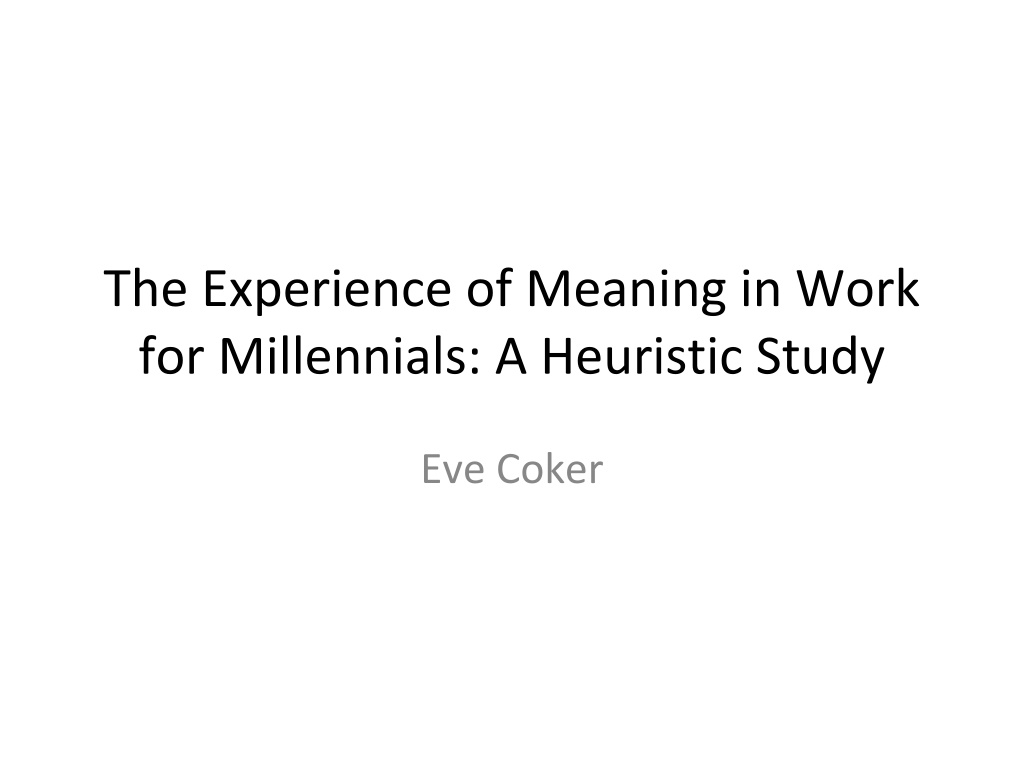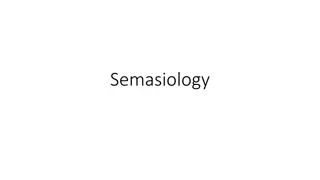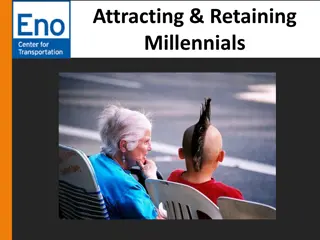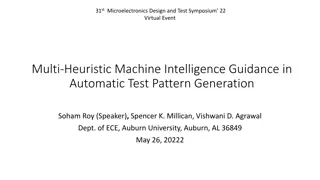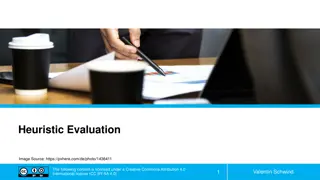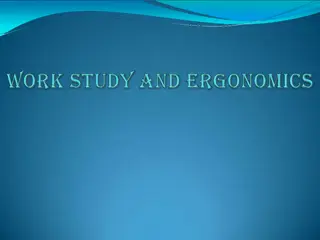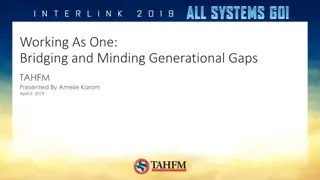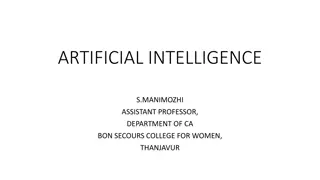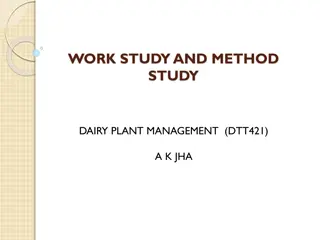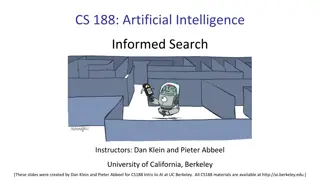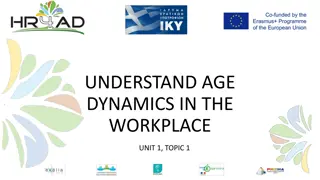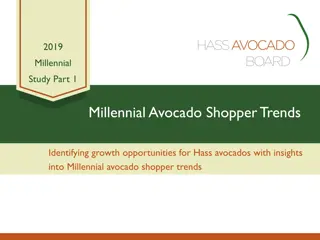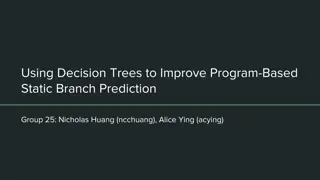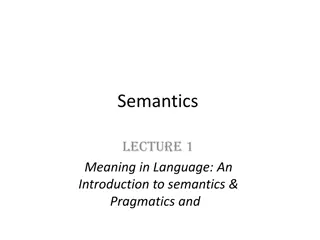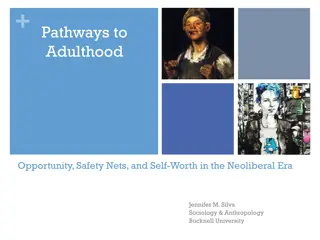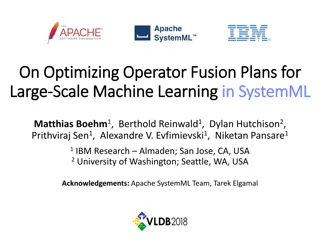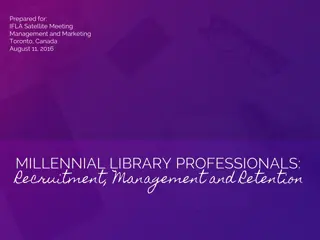Understanding Meaning in Work for Millennials: A Heuristic Study
This study explores the experience of meaning in work for millennials, considering its impact on organizational commitment, change, vision-championing, and leadership. It aims to contribute to the existing knowledge base by examining how millennials perceive and create meaning in their work, using qualitative research methods. The study is guided by existentialist theory and focuses on the unique perspective of the millennial population in the workplace.
Download Presentation

Please find below an Image/Link to download the presentation.
The content on the website is provided AS IS for your information and personal use only. It may not be sold, licensed, or shared on other websites without obtaining consent from the author. Download presentation by click this link. If you encounter any issues during the download, it is possible that the publisher has removed the file from their server.
E N D
Presentation Transcript
The Experience of Meaning in Work for Millennials: A Heuristic Study Eve Coker
Introduction Background Significance of Meaning in Work Millennials in the Workplace Purpose of the Study Contribute to Meaning in Work literature Practical applications for managing millennials Definitions Meaning in Work Millennials
Statement of the Problem Previous research has shown that: Meaning in work can impact greater organizational commitment (Duffy, Allan, Autin, & Bott, 2013; Filstad, 2010; Markow & Klenke, 2005; McCarthy, 2008); positive direction of change (Anderson, 2005; Burger et al., 2012; Love & Cebon, 2008); enhanced vision-championing (Raelin, 2006); and improved leadership (de Sousa & van Dierendonck, 2010; Markow & Klenke, 2005) Millennials may view work meaning differently than prior generations (Deal et al., 2010; Ferri-Reed, 2013; Myers & Sadaghiani, 2010; O Connor & Raile, 2015) But the experience of meaning in work for millennials has not been invested. Based on searches in PsycINFO, PsycARTICLES, and ProQuest Psychology journals. Research Question: What is the experience of meaning in work for millennials?
Theoretical Orientation Qualitative theory as theory-building premise Heuristics looking to using personal knowledge to illicit the meaning behind a shared experience. Predictions made by the theory: Theory will contribute to current knowledge base. Contribution: To current theories on Meaning in Work and theories regarding the Millennial population. Existentialism Frequently used as theoretical orientation in meaning in work studies (e.g., Burger et al., 2013; Blomme & Lintelo, 2012; Lips-Wiersma & Wright, 2012; Macmillan, 2009; Rosso et al., 2010) Predictions made by the theory: Workers will seek to find purpose and avoid existential fears through meaning creation at work. Contribution: Workers experiences of meaning were highly influenced by their sense of personal responsibility.
Literature Review Meaning in work Positive or Negative Influenced by internal and external contexts Associated with meaning in life Millennials Behavior may be influenced by generational circumstances, personal development, or individual personality Contradicting evidence regarding difference between generations
Methodology Qualitative Study Heuristic per Moustakas (1990) Phenomenon under Investigation Exploration of meaning in work for millennials
Methodology - Sample Population: Millennials Sample: Millennials born between 1980 and 1996 Inclusion Criteria: 3+ Years of work Exclusion Criteria: Traumatic work experiences Sample size: 11 Sampling Strategy: IRB-approved fliers at physical locations and social networking sites which members of this population would frequently visit.
Methodology Instrumentation Researcher Preparation Reflexive Journaling Self-Interview Guiding Interview Questions 1. Please tell me about what types of tasks and performance expectations you are required to accomplish. How do you feel about these duties? 2. What are some things that are important to you when it comes to your ability to pursue these tasks and performance expectations? 3. What do you want to do in your organization? Specifically, what tasks and duties are appealing to you? 4. Where do you see yourself going in your organization? 5. We have expectations about how others are supposed to behave, and we experience internal feelings and reactions to their behaviors. How do your relationships with co-workers impact why you do what you do for work? 6. How do your relationships with work leaders impact your perception of why you do these things for work? 7. What benefits and rewards does your work give you, and how strongly do they matter to you? 8. Some workers have little control over how they do their work, whereas others have a lot of control. What are your thoughts about the amount of control that you have over how you do your work? 9. Tell me about any positive and negative experiences related to what you do in your work. How have they affected you? 10. There are many stereotypes about the millennial population. If you have experienced any personally applied to you, how did that affect your ability to do your work? 11. How have these work experiences contributed to your personal health and well-being? 12. How have these work experiences contributed to how you feel about your organization and the work that you do for it?
Methodology Data Collection Screened applicants Provided interview guide and informed consent 24+ hours prior to interview. Met at neutral location Reviewed and obtained signed consent form. Provided $25 gift card Turned on two recording devices Asked questions (deviating from interview guide when appropriate) Ended interview and noted further contact After data analysis, reached out to co-researchers for clarification and review with data points.
Methodology Data Analysis Listened to audio and read interviews in rhythm of rest and work for cognitive processing Circled and clustered units of meaning until common themes emerged Refined common themes with co-researcher quotes Developed portrait of the whole experience Reached out to co-researchers for member checking Developed three individual portraits of co-researchers.
Results - Themes and Patterns Theme 1: Autonomy Pattern 1.1: Need for autonomy after training and guidance Pattern 1.2: Strong dislike for micromanagement Theme 2: Structure and expectations Pattern 2.1: Need for clearly defined parameters and expectations Pattern 2.2: Lack of structure leading to perceptions of unfairness and confusion Theme 3: Value as a person Pattern 3.1: The perception of being valued as a person leading to loyalty and motivation Pattern 3.2: The perception of not being valued as a person leading to meaninglessness Theme 4: Working relationships Pattern 4.1: Like-minded co-workers can make the job enjoyable and drive professional development Pattern 4.2: Co-workers without the same values can lead to a highly negative work experience Theme 5: Altruism Pattern 5.1: Satisfaction in doing good for another person Pattern 5.2: Satisfaction with contributing to the greater good Theme 6: Frustration and Stress Pattern 6.1: Perception of leadership and co-worker behaviors creating a negative environment Pattern 6.2: Being emotionally or personally over-invested in the job Theme 7: Personal Care Pattern 7.1: Learning healthy habits to cope with job stressors Pattern 7.2: Appreciation for company s support in self-care Pattern 7.3: Giving up on trying to do well, and/or planning to leave when needs are not met
Conclusions Conclusions based on the context of this study Positive meaning through: autonomy, parameters, feeling valued, having positive working relationships, and helping others/a larger system. Negative meaning through: lack of parameters, feeling used, having dysfunctional work relationships, and not being able to contribute to their environment. Equilibrium found through: Personal Responsibility Adaptability Powerlessness versus Power Conclusions based on the theoretical framework Personal responsibility is vital to how experiences influence meaning (positive or negative) Some co-researchers typically sought a sense of control and personal responsibility over their environments, and/or expected the organization to meet their expectations Conclusions based on the context of the literature review Conflicting research findings: Millennials seek purpose and meaningfulness in work (Ng et al., 2010) vs. Millennials are more interested in financial rewards (Leveson & Joiner, 2014; Twenge & Kasser, 2013). When positive meaning was met for co-researchers, they blended purpose, meaningfulness, and financial rewards as reasons for investing in their work. When the organization offered negative meaning, co-researchers focused on financial rewards. Congruent with results from Vuori et al. (2010) that participants chose positive actions to attempt to create positive meaning.
Recommendations Limitations No differentiation between genders, calling vs. work-as-job, and geographic location Potential for personal bias and induction errors Racially and SES homogenous sample Self-reporting bias from co-researchers Recommendations Differentiate by gender, calling vs. work-as-job, and geographic location Replication: Different qualitative methodology, different populations Quantitative regression analysis of themes and patterns as predictors of positive/negative meaning in work Addressing delimitations: Asking questions based on patterns in literature
Thank you Thanks to Dr. Sara Jarvis, Dr. Elliot Benjamin, and Dr. Bruce Fischer. Question and Answer
